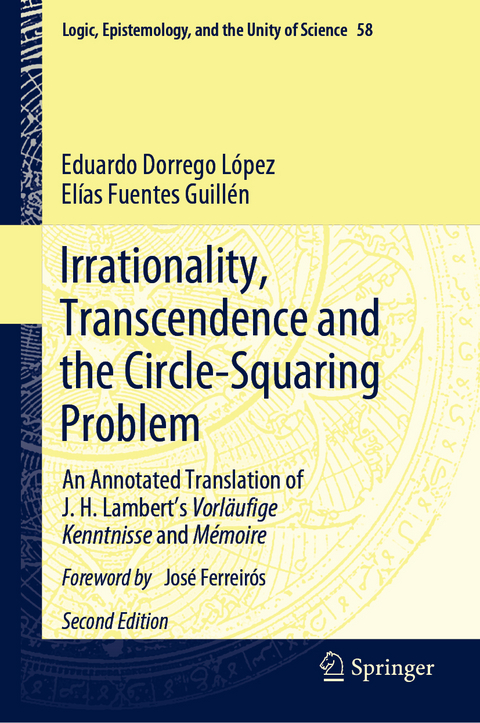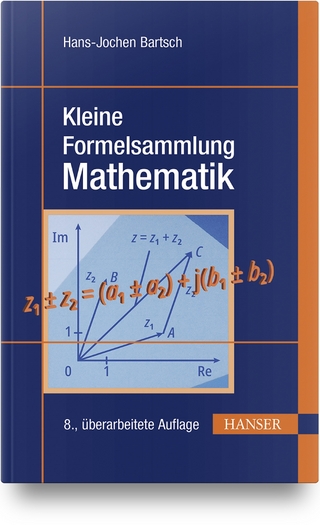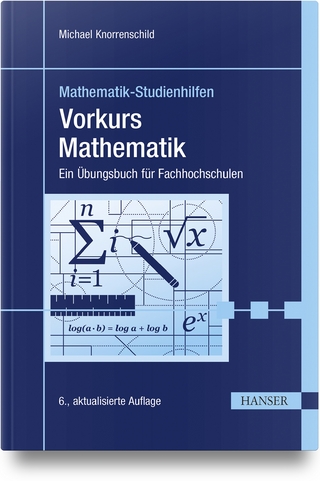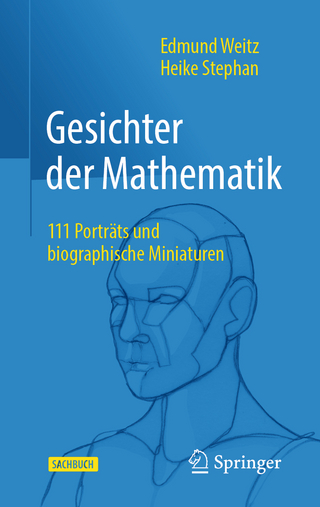
Irrationality, Transcendence and the Circle-Squaring Problem
Springer International Publishing (Verlag)
978-3-031-52222-2 (ISBN)
This publication, now in its second edition, includes an unabridged and annotated translation of two works by Johann Heinrich Lambert (1728-1777) written in the 1760s: Vorläufige Kenntnisse für die, so die Quadratur und Rectification des Circuls suchen and Mémoire sur quelques propriétés remarquables des quantités transcendentes circulaires et logarithmiques. The translations, as in the first edition, are accompanied by a contextualised study of each of these works and provide an overview of Lambert's contributions, showing both the background and the influence of his work. In addition, by adopting a biographical approach, it allows readers to better get to know the scientist himself.
Lambert was a highly relevant scientist and polymath in his time, admired by the likes of Kant, who despite having made a wide variety of contributions to different branches of knowledge, later faded into an undeserved secondary place with respect to other scientists of the eighteenth century. In mathematics, in particular, he is famous for his research on non-Euclidean geometries, although he is likely best known for having been the first who proved the irrationality of pi. In his Mémoire, he conducted one of the first studies on hyperbolic functions, offered a surprisingly rigorous proof of the irrationality of pi, established for the first time the modern distinction between algebraic and transcendental numbers, and based on such distinction, he conjectured the transcendence of pi and therefore the impossibility of squaring the circle.
Eduardo Dorrego López studied Mathematics (minor in Pure Mathematics) at the University of Santiago de Compostela (USC), where he also obtained his Master's degree in the Department of Algebra. He got enrolled into the "Doctorate in Mathematics" program at the Institute of Mathematics of the University of Seville (IMUS) obtaining his PhD in History of Mathematics under the supervision of Prof. José Ferreirós (2021). His research focuses on the development of irrational and transcendental quantities in the 18th and 19th centuries, as well as on the work of Johann Heinrich Lambert. He has carried out research stays in Oxford and Seville working primarily on Lambert and Lagrange. He has published a book (in Spanish) on Lambert and his contribution to the irrationality of pi and the circle-squaring problem (with Elías Fuentes Guillén; College Publications, 2021), as well as a book chapter (in Spanish) on Lambert's work about non-euclidean geometries (with José Ferreirós; Plaza y Valdés, forthcoming). He is also a high school mathematics teacher.
Elías Fuentes Guillén is a researcher at the Institute of Philosophy of the Czech Academy of Sciences and head of the GA CR Junior Star project "Normalisation and Emergence: Rethinking the Dynamics of Mathematics". Previously he held postdoctoral positions at the Department of Mathematics of the Faculty of Sciences at UNAM and the Institute of Philosophy of the Czech Academy of Sciences. His research focuses on the transition from mathematical practices that were common in the late 18th century to practices that emerged in the second half of the 19th century, as well as on the work of Bernard Bolzano. His recent publications include the book Matematické dílo Bernarda Bolzana ve svetle jeho rukopisu (Nakladatelství Filosofia, 2023), a chapter for Springer's Handbook of the History and Philosophy of Mathematical Practice (2022) and "The 1804 examination for the chair of Elementary Mathematics at the University of Prague" (with Davide Crippa; Historia Mathematica, 2021).
Part I: Antecedents.- Chapter 1. From Geometry to Analysis.- Chapter 2. The situation in the first half of the 18th century. Euler and continued fractions.- Part II: Johann Heinrich Lambert (1728-1777).- Chapter 3. A biographical approach to Johann Heinrich Lambert.- Chapter 4. Outline of Lambert's Mémoire (1761/1768).- Chapter 5. An anotated translation of Lambert's Mémoire (1761/1768).- Chapter 6. Outine of Lambert's Vorläufige Kenntnisse (1766/1770).- Chapter 6. An anotated translation of Lambert's Vorläufige Kenntnisse (1766/1770).- Part III: The influence of Lambert's work and the development of irrational numbers.- Chapter 8. The state of irrationals until the turn of the century.- Chapter 9. Title to be set up.
| Erscheinungsdatum | 04.05.2024 |
|---|---|
| Reihe/Serie | Logic, Epistemology, and the Unity of Science |
| Zusatzinfo | XXI, 167 p. 13 illus., 7 illus. in color. |
| Verlagsort | Cham |
| Sprache | englisch |
| Maße | 155 x 235 mm |
| Themenwelt | Mathematik / Informatik ► Mathematik ► Allgemeines / Lexika |
| Mathematik / Informatik ► Mathematik ► Geschichte der Mathematik | |
| Schlagworte | 18th and 19th Century Mathematics • Continued fractions • decimal expansions • Echegaray's Disertaciones matemáticas • Euler and continued fractions • Euler and continued fractions, irrationality and transcendence • History of Mathematics • Irrationality of Pi • Johann Heinrich Lambert • Lambert and non-Euclidean geometry • Lambert and the Berlin Academy of Sciences • Lambert's Mémoire • Lambert's Vorläufige Kenntnisse • Lambert's work and the development of irrational numbers • philosophy of mathematics • The Circle-Squaring Problem • Trascendental Numbers |
| ISBN-10 | 3-031-52222-2 / 3031522222 |
| ISBN-13 | 978-3-031-52222-2 / 9783031522222 |
| Zustand | Neuware |
| Haben Sie eine Frage zum Produkt? |
aus dem Bereich


